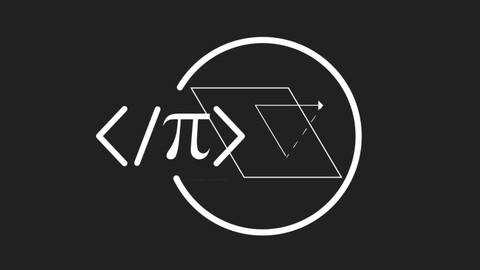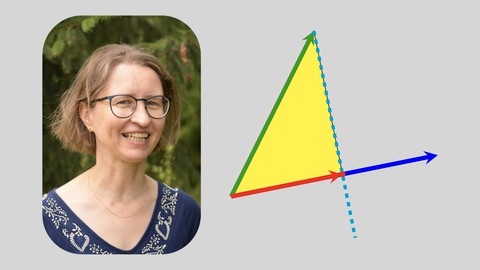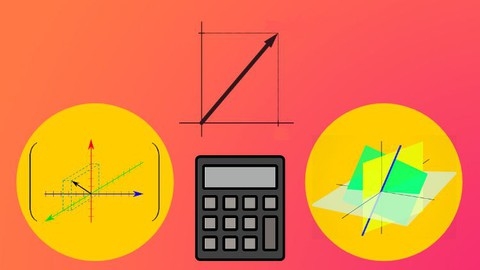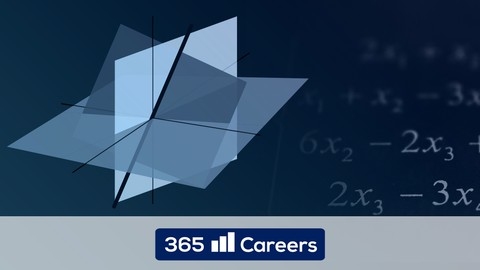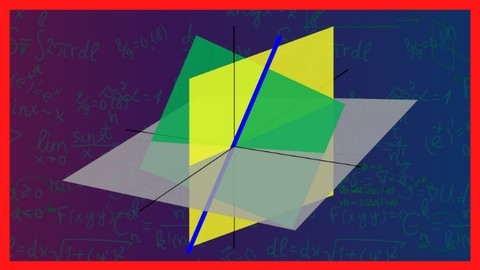Linear algebra is a fundamental branch of mathematics that deals with vectors, matrices, and systems of linear equations.
It’s essential for understanding various fields like computer science, engineering, physics, and data science.
By mastering linear algebra, you can gain valuable skills in solving complex problems, analyzing data, and creating efficient algorithms.
Finding a comprehensive and engaging linear algebra course on Udemy can be a challenge.
You’re looking for a program that provides a solid foundation in theory, practical applications, and perhaps even includes coding exercises to solidify your understanding.
We’ve carefully reviewed numerous Udemy courses and have identified Become a Linear Algebra Master as the best overall course.
The course covers essential linear algebra topics including vectors, matrices, determinants, eigenvalues, and eigenvectors.
It also delves into advanced concepts like orthogonality, change of basis, and the Gram-Schmidt process.
Throughout the course, you’ll learn how to apply these concepts to solve real-world problems in fields like engineering, computer science, and data analysis.
While this is our top pick, other excellent options are available on Udemy.
Keep reading to explore our recommendations for different learning styles and goals, from beginner-friendly introductions to advanced courses focusing on specific applications of linear algebra.
Become a Linear Algebra Master
You’ll start by mastering the fundamentals of matrices and their operations, learning to represent and solve linear systems using methods like Gauss-Jordan elimination.
You’ll explore different matrix types, including identity and zero matrices, and understand their interactions.
Next, you’ll delve into the world of vectors, exploring operations, linear combinations, and spans.
You’ll gain a solid understanding of concepts like linear independence and subspaces, which are crucial for comprehending the structure of vector spaces.
You’ll then move on to dot products and cross products, tools used to calculate angles and distances between vectors.
These concepts have real-world applications, particularly in fields like physics and computer graphics.
As you progress, you’ll study matrix-vector products and the core concepts of null spaces and column spaces.
You’ll learn to solve equations like Ax=b, a cornerstone of linear algebra.
You’ll also explore the relationship between null space, column space, and the rank of a matrix.
The course then focuses on transformations, explaining how matrices can be used to represent transformations in space.
You’ll learn about linear transformations, rotations, and projections, discovering how these concepts can model real-world phenomena.
You’ll also discover how to combine and scale linear transformations.
You’ll gain a deep understanding of inverses, learning how to find the inverse of a transformation and how invertibility relates to the matrix-vector product.
You’ll explore invertible and singular matrices and learn to solve systems of equations using inverse matrices.
The course delves into determinants, a key concept in linear algebra.
You’ll learn to calculate determinants and use them to solve systems of equations using Cramer’s rule.
The course also covers how to modify determinants and use them to find areas in geometric shapes.
You’ll learn about transposes and their impact on determinants, products, sums, and inverses.
You’ll also explore the relationship between the null and column spaces of a matrix and its transpose.
The course covers LU factorization, a powerful technique for solving systems of equations and analyzing matrices.
The final part of the course focuses on orthogonality and change of basis.
You’ll learn about orthogonal complements, how to project onto subspaces, and how to find the least squares solution to a system of equations.
You’ll also learn how to express vectors in different bases.
The course culminates with orthonormal bases and the Gram-Schmidt process, a method for creating orthonormal bases from any set of linearly independent vectors.
This process is vital for understanding and applying linear algebra in various fields.
You’ll wrap up the course with eigenvalues and eigenvectors, key concepts in linear algebra.
You’ll learn how to find them and how they relate to the behavior of linear transformations.
This course provides a thorough foundation in linear algebra, a vital subject in many fields, including engineering, computer science, physics, and statistics.
You’ll gain practical skills that you can apply to real-world problems.
For instance, you’ll learn to solve systems of equations using matrices, understand the geometry of vectors, and analyze transformations in space.
These skills are highly valuable for anyone seeking to pursue a career in STEM or related fields.
Complete linear algebra: theory and implementation in code
This comprehensive course guides you through the fundamentals of linear algebra, covering a broad range of topics from basic vector operations to advanced techniques like eigendecomposition and singular value decomposition (SVD).
You’ll gain hands-on experience with these concepts, applying them in both Python and MATLAB.
You’ll start by exploring vectors, understanding their algebraic and geometric interpretations, and learning about operations like addition, subtraction, multiplication, and the dot product.
You’ll delve into concepts like vector length, orthogonality, and angles.
The course then seamlessly transitions to matrices, covering operations like addition, subtraction, multiplication, and transpose.
You’ll also gain a strong understanding of matrix rank and its applications, exploring the different subspaces associated with matrices.
Moving forward, you’ll learn to solve systems of equations using Gaussian elimination, understanding concepts like echelon form and pivots.
The course then dives into the important concept of the determinant of a matrix, showcasing its various applications.
You’ll learn to compute the inverse of a matrix using the MCA algorithm, a valuable tool for solving linear equations.
The course then introduces you to projections and orthogonalization, exploring essential techniques like the Gram-Schmidt procedure and QR decomposition.
These techniques are crucial for solving linear equations and understanding the relationships between vectors.
The final stages of the course take you into the fascinating world of eigendecomposition and SVD.
These powerful tools find extensive use in fields like machine learning and data analysis.
You’ll learn how to find eigenvalues and eigenvectors, and how to use eigendecomposition to diagonalize matrices.
You’ll explore the connections between SVD and eigendecomposition, understanding how SVD can be used for low-rank approximations.
Finally, you’ll learn about the condition number of a matrix, a critical concept in numerical computations.
You’ll explore quadratic forms and their applications, including principal component analysis (PCA), a powerful technique for dimensionality reduction.
Throughout the course, you’ll have the opportunity to solidify your understanding by engaging in hands-on code challenges, directly applying what you’ve learned.
Linear Algebra and Geometry 1
You’ll begin by exploring coordinate systems, vectors, and their representation in both the plane and 3-space.
This foundation leads you to delve into linear combinations and matrices, which are key to understanding linear transformations—the powerful tools for manipulating and transforming geometric shapes.
You’ll learn how to multiply matrices and connect this operation to solving systems of linear equations, a core application of linear algebra.
The course then delves deeper into the world of matrices, covering addition, subtraction, scaling, and multiplication.
You’ll learn how to find the inverse of a matrix and solve matrix equations.
You’ll also explore the intriguing geometric interpretations of determinants, uncovering their significance in linear algebra.
The course doesn’t stop at theoretical concepts; it also demonstrates how linear algebra can be applied to real-world problems in fields like Chemistry and Electrical circuits.
Next, you’ll dive into the world of vectors, learning how to calculate their lengths, angles between them, and how to project one vector onto another.
This understanding allows you to analyze and manipulate geometric objects in space.
You’ll be introduced to the cross product, a tool for calculating areas and volumes in 3-space.
The course then transitions to lines and planes in 2D and 3D space, building a solid foundation in geometry.
You’ll learn how to find equations for lines and planes, determine their intersection, and calculate distances between them.
You’ll also discover how to apply linear algebra techniques to solve problems involving lines, planes, and points.
The course concludes by placing linear algebra and geometry within a broader mathematical context, setting the stage for further exploration of advanced concepts in future courses.
Linear Algebra for Data Science & Machine Learning A-Z 2024
You’ll start by building a solid foundation in the basics of matrices, learning about their representation, dimensions, and how to access individual elements.
Throughout the course, quizzes will help you reinforce your understanding of key concepts.
Moving on, you’ll delve into matrix operations like addition, subtraction, scalar multiplication, and matrix multiplication.
You’ll learn how to calculate determinants, find inverses, and apply these skills to solve real-world problems.
The course will guide you through both the co-factor method and the Gauss-Jordan elimination method for finding inverses, ensuring you gain a deep understanding of these crucial techniques.
You’ll also explore the properties of determinants and their role in linear algebra.
The course then introduces you to the world of vectors, covering scalars, vector addition and subtraction, and the importance of the unit vector.
You’ll learn about vector spaces and their properties, including subspaces and nullspaces.
Key concepts like span, spanning sets, linear dependence, and independence are explored in detail.
Finally, you’ll delve into eigenvalues and eigenvectors, which are essential for understanding the behavior of linear transformations.
By mastering the principles of linear algebra, you’ll gain a strong foundation for further exploration in advanced data science and machine learning concepts.
Linear Algebra and Feature Selection in Python
This course offers a comprehensive exploration of linear algebra, starting with the fundamentals and building towards practical applications in data analysis.
You’ll gain a deep understanding of vectors, matrices, and their properties, equipping you to solve systems of equations using methods like Gaussian elimination.
The course then delves into the exciting realm of dimensionality reduction, a critical technique for simplifying complex datasets.
You’ll learn about the “curse of dimensionality” and discover how powerful methods like Principal Component Analysis (PCA) and Linear Discriminant Analysis (LDA) can overcome this challenge.
Through practical examples using real-world datasets, such as California estates and wine quality data, you’ll gain hands-on experience applying these methods in Python.
The course balances theoretical concepts with practical application, providing you with a solid understanding of both the mathematical foundations and the practical implications of linear algebra in data analysis.
Linear Algebra for Beginners: Open Doors to Great Careers
This course provides a comprehensive and well-structured introduction to linear algebra, covering essential concepts from solving systems of linear equations to vector spaces and change of basis.
You’ll start by mastering fundamental techniques like Gaussian elimination and row echelon form, building a solid foundation for understanding more advanced concepts.
The course emphasizes practical applications, demonstrating how linear algebra is used in various fields, including engineering, computer science, finance, and economics.
You’ll learn to analyze data, solve problems involving optimization, and gain insights into the mathematical principles that govern real-world phenomena.
One of the strengths of this course lies in its focus on problem-solving.
You’ll be presented with a wealth of practice problems, accompanied by detailed solutions, allowing you to test your understanding and solidify your grasp of the material.
The course also delves into the theoretical aspects of linear algebra, exploring the properties of matrices, determinants, and vector spaces.
This theoretical understanding will deepen your comprehension of the subject and provide a strong framework for future learning.
While the course covers a wide range of topics, it does so in a clear and organized manner, making it accessible to students with varying backgrounds.
The pace of the course is well-suited for those seeking a thorough introduction to linear algebra, whether for academic or professional purposes.
College Level Advanced Linear Algebra! Theory & Programming!
You’ll begin by mastering the basics of matrices, linear independence, and matrix multiplication.
Don’t worry, these seemingly abstract ideas will quickly come to life as you learn how to use them to solve real-world problems in Python and Matlab.
You’ll delve into powerful techniques like Gaussian elimination, matrix inverses, and the LU decomposition, gaining a deep understanding of how these methods are used in computer graphics, robotics, and machine learning.
Visualize how linear algebra can model rotations, translations, and reflections in 3D space, essential for creating stunning computer graphics.
Explore how it’s used to represent and manipulate robotic systems, giving you a glimpse into the future of automation.
And speaking of the future, you’ll gain invaluable expertise in machine learning concepts like Principal Component Analysis (PCA) and the Singular Value Decomposition (SVD).
These techniques will empower you to analyze and manipulate data, mastering data whitening and dimensionality reduction.
You’ll even delve into the mathematics behind maximum likelihood estimation for Gaussian distributions, a crucial foundation for many machine learning algorithms.
This course will provide you with a robust understanding of the deep connection between linear algebra and machine learning, equipping you with the tools to tackle complex data analysis challenges.
Master Linear Algebra 2020: The Complete Study Of Spaces
This comprehensive linear algebra course takes you on a journey from fundamental concepts to advanced applications.
You’ll begin by mastering the foundations of matrices and systems of linear equations, learning how to manipulate matrices using reduced row echelon form (RREF) and delving into the intricacies of matrix algebra.
As you progress, you’ll dive into the fascinating world of vector spaces, exploring their properties and axioms, and gaining a deep understanding of subspaces, span, and linear independence.
You’ll also learn how to determine a basis for a vector space, explore the concept of change of basis, and understand the role of fundamental subspaces.
The course then introduces you to linear transformations, demonstrating how they map vectors in one space to another and how to represent them using matrices.
You’ll discover how to apply these transformations to solve real-world problems.
The final section delves into the intriguing realm of orthogonality, norms, and inner product spaces.
You’ll learn about the dot product, cross product, and Euclidean n-space.
The course covers the importance of least squares solutions in dealing with problems that lack exact solutions, explores orthogonal spaces, projections, and orthonormal sets, and culminates in a detailed exploration of eigenvalues and eigenvectors.
These powerful concepts are essential for solving linear systems and understanding the behavior of linear transformations.
While the course provides a robust foundation in linear algebra, it’s important to note that it is demanding.
The material requires dedicated effort and consistent practice to fully grasp.
However, the comprehensive coverage and clear explanations make it an excellent resource for students seeking a deep understanding of this essential mathematical discipline.
Also check our posts on:


